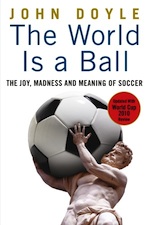
Fans react after Spain scored during the World Cup soccer group H match between Spain and Chile, on a large screen outside the Santiago Bernabeu stadium in Madrid
John Doyle
The Globe and Mail
Published on Sunday, Jun. 27, 2010
To the Plaza Famingo on College St. on Friday afternoon to see Spain play Chile. This story is the World Cup Thing in the middle of the G20 Thing, part two.
The Flamingo is a sprawling place – dining, dancing and live entertainment. Salsa lessons are offered, a sign says. That’s not traditional salsa booming out of giant speakers by the door and everywhere inside. It’s crashing guitars and the throbbing beat of Latin disco. The mood, before you even enter, in broad daylight, is feverish, lightheaded.
There’s a fuss getting in. About 30 Chilean supporters arrive just before me. And the place inside looks packed, already. The person I’m meeting calls on the cell: “I can see the top of your head out there. There’s a seat for you. You can probably skip the line-up and say you’re meeting people inside.” I do. The Chileans don’t mind. The want to sit together and negotiations are under way. The man at the door is frazzled, skittish. Inside, he music is ferociously loud, bone-shaking. There’s a giant screen showing the end of the Coe D’Ivoire/North Korea game. Nobody is paying attention. Two young women in teensy Brazil shirts are dancing by the bar. For themselves. Two brunette Shakira’s.
A seat is found at the long rows of tables and a drink ordered. A look around. There are hundreds of women, of all ages, in Chilean shirts, many waving Chilean flags. Some are engaged in painting each other’s faces in Chile’s colours. It’s like a beauty salon in the middle of the supporters in the stands in a stadium. Nobody can her anyone talk. People shout. The women take pictures of each other with their newly-painted faces. I’m sitting across from a man who looks vaguely amused. A handshake. Can’t hear anything he’s saying. Can’t hear my friend either. We point and gesture.
Game time. The music stops. On the giant screen the footage on TeleLatino shows the players in the tunnel. There’s a deafening roar. Everyone stands for the national anthems. Everybody. No Anglo gets away with being the mere observer. While the referee gets the team captains together, the singing starts: “Ole, Ole, Ole, Ole, Chile!” Two young women stand on their chairs and roar “Espana!” over and over. The crowd, it seems, is two thirds Chilean and one-third Spanish. I’m staring at the Spanish women standing on their seats, and the Chilean guy who shook my hand is laughing at me – a gawking tourist wandered over from the other part of the World Cup, the one absurdly concerned with England, or Germany. No dancing over there, his laugh says, no sea of women who look like this, sound like this, dance like this.
Spain needs to win. Chile needs to win. All depends of the result of other game – Switzerland playing Honduras. Chile starts brightly, all attack and gusto. Short passes, darting runs. A shiver of delight goes through the mass of people around me whenever Alexis Sanchez has the ball. The pace is furious, goals are coming and everyone knows it. In the tightly packed crowd, people grip each other, instinctively, to express the tension. We are all lost in it, the endless running, the one-two passes, the sliding tackles, the goalkeeper soaring to get a fingertip to the ball. This is euphoria.
Referee Marco Rodriguez of Mexico, barrel-chested and stern-faced, comes and goes in the flowing drama, sometimes as hero, waving off claims for fouls, sometimes as villain. Oh no, he’s giving out yellow cards to Chile. Estrada’s got one and Estrada is fiery. A mass of people by the bar scream insults at Rodriguez. Spain is getting a grip on the game now. Sharp, sweet passing movements. Torres on the move. The Chilean keeper panics, the ball goes to Villa who is far, far from the goalmouth but hits it confidently. Goal! And a beautiful one. The heaving mass, undaunted, roars Chile on and, yes, Chile race forward.
Then madness and chaos as Spain score again, from another exquisite passing move. Emotions are flaring on the field. The referee reaches into his pocket and, cruelly, issues another yellow to Estrada. Two yellows is one red. Estrada’s gone, Chile down to ten men. The referee is commonly known as “Dracula”, I am informed.
Half-time and nobody’s interested in the punditry on the screen. The music starts up again. Seeking air on the tiny front patio I find four guys smoking in one corner and three girls dancing in the other. A large crowd is on the street, waiting and hoping to get in. The guy manning the door looks exhausted. Not the Chilean team. Back on the field they lay siege to Spain’s goal. A man down, but seething with lust to score. They do. Millar tries a what-the-hell shot from distance. Spain’s defenders are unsure. The ball is deflected into the net. Pandemonium. I notice that everyone around me has changed places. Friends to be hugged, smiling faces to be kissed. The young Spanish ladies are in front of me again and shouting. No one can hear them. Or anything else.
Chile defends. Spain makes substitutions. Fabregas comes on. There’s a roar for that from somewhere. The score in the other game is Switzerland 0, Honduras 0, it says on the screen. If it stays that way, both Spain and Chile survive for the next round. This game slows, maddeningly. Spain passes the ball endlessly in the middle, declines to move forward. No one is sure what’s happening but the euphoria never evaporates. Hang on, and everything will be alright. Move the ball, here, there, anywhere.
Its over. The music – some serious rock ‘n roll with big guitar sound and major chords. Something about Espana. A march starts onto the street. Honking horns and waving flags. Dozens of women are dancing on the sidewalk. Hip-grinding, arm waving, lascivious dancing. What a party this is. Doesn’t matter who won or lost.
Down the street, I stop for coffee. Not drunk, but feel I need to sober up. Across the street, a young man in a Spain shirt, with “Torres” on the back, kisses his girlfriend, a young woman in cut-off jeans and shirt that just says ”Spain.” Then he pulls her into the doorway of Bikkuri Sushi and kisses her again. The kiss lasts seven minutes, by my watch.
The cops have arrived, to no point. Isn’t there a G20 protest somewhere? I walk back and watch. Hulking and grumpy, the cops wave people off the street and onto the sidewalk. The young women keep dancing. Shakira moves, all thighs and hips. Old men in Chilean shirts smoke cigarettes and stare at the cops staring at the women. Their faces betray nothing, their eyes betray everything. The cops go away, as they must. The dancing goes on.


